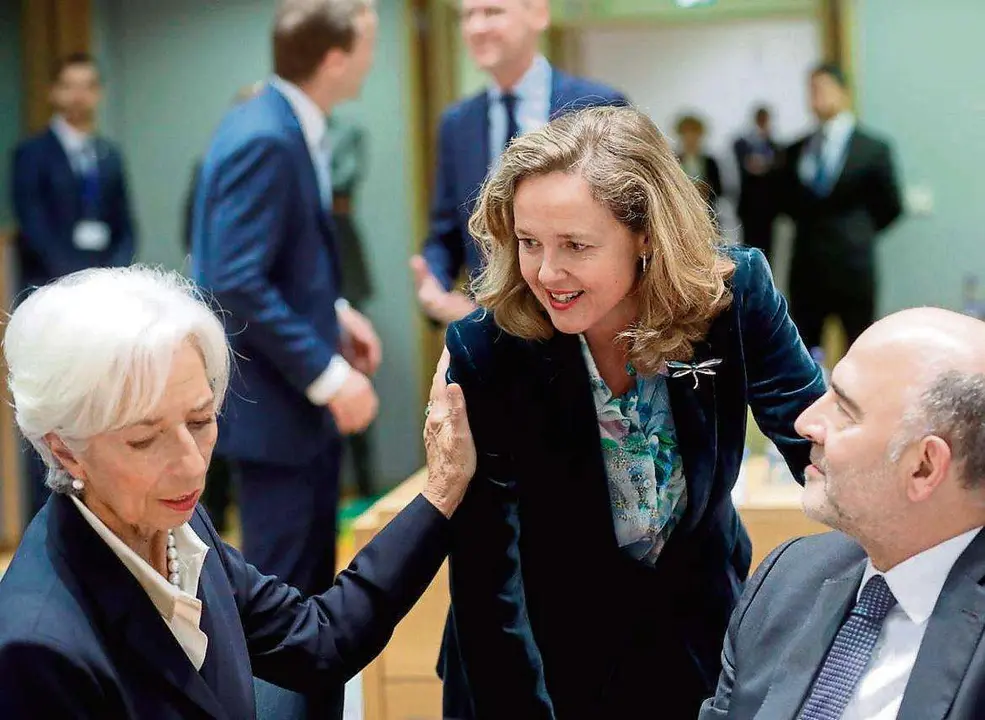Calviño receives the EU's kick to the Sánchez-Iglesias tandem

By virtue of holding and even abusing power on a national scale, it is logical to believe that this power extends just as strongly beyond borders. Imbued with this conviction, the shock of reality becomes more painful. The government of Pedro Sánchez had led it to believe that the third vice-president, Nadia Calviño, had a very serious chance of becoming the president of the Eurogroup, the informal but very influential Sanhedrin of the finance ministers of the 19 countries that make up the euro area. Certainly, the effort of Sánchez himself and his vice-president had been gigantic, apparently achieving at least the promise that Calviño would be supported by the largest countries of the European Union: Germany, France and Italy.
Together with the other members of the Eurogroup, it will never be known whether or not this support materialised, since the votes are so secret that the only people who know the breakdown of the vote are the two Community officials responsible for counting and communicating the candidates. Suspicion is the norm in these international contests, and it should be remembered that in 2015 the French Minister, Michel Sapin, had promised his vote to Luis de Guindos, who would later receive confirmation from the French minister that he had promised nothing at all.
Despite all its shortcomings, which are many, the EU has a serious component that is by no means negligible. In this case, this means that, however strong Nadia Calviño's personal credentials may be, the Eurogroup would not respect itself if it had put the representative of a government that has distinguished itself in the two years it has been in office by not respecting any of the warnings and indications from Brussels. Its lack of control over spending and its constant recourse to debt to cover current expenses, in addition to projecting the image of instability that its supposedly solid alliance with the United Nations Podemos represents, accentuated the mistrust of the so-called frugal countries, those that do not admit to a single joke with their own taxpayers' money.
The intellectual soundness and solvency of her actions as a senior European official have not been enough for Nadia Calviño to become the head of the Eurogroup, not even her status as a woman; the reticence of the countries that will finally provide most of the funds for a social-communist government, unprecedented in the European Union until the alliance between Sánchez and Iglesias, has been more than enough. Now it's time to digest the setback, a drink that is all the more bitter because the hopes that had been raised for a Spanish woman to head the Eurogroup were so great.
Ireland's Paschal Donohoe and the challenges for Spain
The beneficiary of the Spanish woman's defeat is her Irish colleague Paschal Donohoe, 45, Minister of Finance since 2017 and a member of the conservative Fine Gael. He will be the interlocutor of the heads of government at the European Councils, starting with next week's decisive one, in which the agreement for the distribution of the Recovery Fund should be concluded, the decisive manna on which it will depend if Spain, like Italy and France in particular, is to stick its head out or progress a little further towards ruin, accelerated by the coronavirus pandemic.
Donohoe will now be the driving force behind such far-reaching debates as the establishment of the multiannual Community budget (2021-2027), the strengthening of the role of the euro and the completion of the unfinished process of the Banking Union. Not to mention another issue, which is also vital for Spain: the drafting of the conditionality rules that will be required of the countries receiving the huge aid that is planned. In short, the evaluation of the national reform plans to which those who will receive such a longed-for shower of millions will have to submit. An examination that we can foresee, without the risk of being mistaken, in which not only will the most extravagant expenses pass, but also - and what is worse - such deserved social items as pensions, for example, if their viability is not clearly demonstrated.
Despite the siren calls, therefore, times of austerity and severe cuts are coming, in which Calviño's role as head of the country's economic affairs will be decisive in convincing his Eurogroup colleagues of Spain's seriousness in drawing up a genuine programme for the country's recovery, and what is even more important: to fulfil it.

